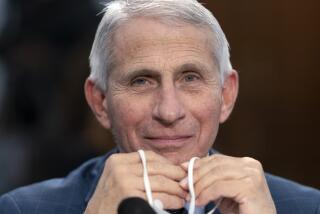Bush Arms Adviser Quits; Tiff With Baker Blamed
- Share via
WASHINGTON — Edward L. Rowny quit today as a senior arms control adviser to President Bush. Sources said Rowny resigned over what he felt was undue haste in completing a treaty with the Soviet Union to limit strategic nuclear missiles.
Bush accepted Rowny’s resignation with “deep regret” and said he had always valued his adviser’s candor and loyalty.
“You have served as one of the principal architects of the American policy of peace through strength,” Bush said in a letter the 73-year-old retired Army lieutenant general.
Rowny, who will leave his post June 30, said in a statement that he looks forward “to contributing to his (Bush’s) efforts for peace through strength.”
White House spokesman Marlin Fitzwater said Rowny had authorized him to say there was no disagreement or reason to leave other than a desire to take positions outside government.
But the sources, who spoke on condition of anonymity, said Rowny disagreed with Secretary of State James A. Baker III over Baker’s pushing to complete the treaty at what Rowny felt was too fast a pace.
“He wanted to slow down START (the Strategic Arms Reduction Treaty talks) before we give up too much,” said a source outside the government and close to Rowny. “He is saying, ‘What’s the rush?’ ”
The Administration would like to conclude at least a framework agreement on the key START issues for initialing by Bush and Soviet President Mikhail S. Gorbachev at their summit meeting that begins in Washington on May 30.
“He is saying, by resigning, ‘Why sacrifice the national security in a rush to get a glad hand and a smile from Gorbachev?’ ” the source said. “He will now make that point as a private individual.”
Rowny will become a senior associate at the Center for Strategic and International Studies, a private research group in Washington, and a visiting professor at George Washington University.
The United States and the Soviet Union remain far apart on several key issues in the START talks. Among them are the procedures for verifying that missile reductions have been carried out, whether to impose ceilings on land-based and sea-launched cruise missiles with multiple nuclear warheads and what kind of limitations to place on cruise missiles carried aboard jet fighters.
More to Read
Sign up for Essential California
The most important California stories and recommendations in your inbox every morning.
You may occasionally receive promotional content from the Los Angeles Times.













